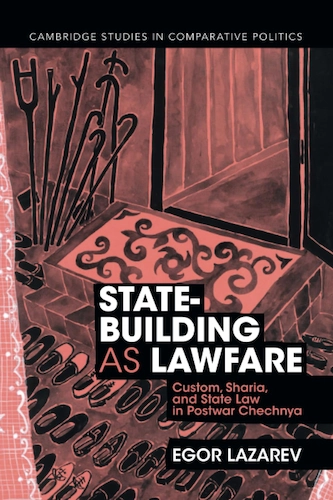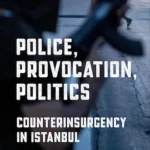Egor Lazarev’s State-Building as Lawfare: Custom, Sharia, and State Law in Postwar Chechnya (Cambridge University Press, 2023), winner of the 2024 Wayne S. Vucinich Book Prize, offers a compelling analysis of how legal pluralism shapes state-building processes in Chechnya. Drawing from extensive fieldwork conducted between 2014 and 2016, Lazarev challenges traditional narratives that depict Chechnya as either a lawless territory or a monolithic authoritarian enclave under Ramzan Kadyrov.
Lazarev introduces the concept of “lawfare” to describe the strategic use of state and non-state legal systems—Russian state law, Chechen customary law (adat), and Islamic law (sharia)—to achieve political and social objectives.
Rather than viewing legal pluralism as a sign of weak state capacity, Lazarev argues that it is a deliberate tool employed by both the Chechen government and local communities to consolidate power, maintain social order, and negotiate authority. This approach reframes legal pluralism as an active arena where the state, religious institutions, and customary norms intersect and compete.
The book is structured around three thematic parts. The first section outlines the theoretical framework, situating Chechnya’s legal pluralism within broader debates on state sovereignty and political order. Lazarev critiques existing models of state-building, emphasizing the need to consider how non-state legal systems contribute to state formation from both top-down and bottom-up perspectives.
The second section explores the historical evolution of legal systems in Chechnya, from imperial and Soviet rule to the post-war period. Lazarev highlights how armed conflict disrupted traditional social hierarchies, particularly gender roles, leading to new forms of legal engagement. The rise of neotraditionalist policies under Kadyrov, including the promotion of adat and sharia alongside state law, illustrates how the regime uses legal pluralism to reinforce its legitimacy and control.
In the final section, Lazarev presents empirical case studies based on fieldwork and court data analysis. He examines how Chechen citizens navigate the overlapping legal systems, often choosing forums based on pragmatic considerations such as accessibility, perceived fairness, and social networks. Notably, Lazarev documents the gendered dimensions of legal pluralism, showing how women leverage state law to challenge patriarchal norms when customary and religious systems fail to protect their rights.
State-Building as Lawfare is a significant contribution to the study of legal pluralism and state formation. Lazarev’s rigorous methodology and nuanced analysis offer fresh insights into the complex dynamics of governance in Chechnya. This book is essential reading for scholars of political science, legal studies, and post-conflict societies, providing a framework that can be applied to other contexts where state and non-state legal systems coexist. For those seeking a comprehensive analysis of legal pluralism and state formation in postwar Chechnya, the book is available here.








